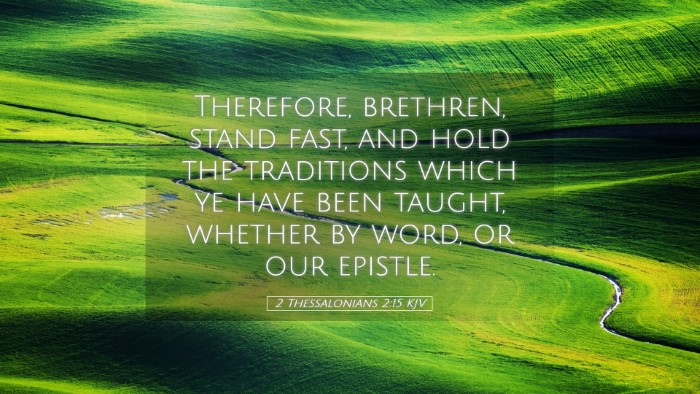Commentary on 2 Thessalonians 2:15
Text of 2 Thessalonians 2:15 (ESV): "So then, brothers, stand firm and hold to the traditions that you were taught by us, either by our spoken word or by our letter."
Introduction
The Apostle Paul, in his second letter to the Thessalonians, addresses the church's concerns regarding the end times and encourages them to maintain their faith amidst confusion and deception. In 2 Thessalonians 2:15, Paul exhorts the believers to stand firm, highlighting the importance of adhering to the teachings passed down to them. This exhortation serves as a call to vigilance and steadfastness in the faith.
Exegesis of the Verse
Paul begins this verse with the directive: "So then, brothers." This familial term underscores the bond shared among believers and brings a sense of unity as he gives a vital instruction.
1. Stand Firm
The phrase "stand firm" suggests a posture of resistance and perseverance. Matthew Henry notes that Paul calls for firmness amidst widespread deception—the need to resist false teachings that had emerged in their midst. That firmness is not simply passive but active, entailing a commitment to holding on to the truths of the faith amidst trials.
2. Hold to the Traditions
Paul instructs them to "hold to the traditions." These traditions refer not only to oral teachings but also to written doctrines. Albert Barnes emphasizes that these traditions must be preserved as they are authoritative truths derived from the teachings of the apostles. The traditions are a means through which God has revealed His will and truth to the church and are critical for its unity and doctrinal integrity.
Oral and Written Teachings
Paul distinguishes between "our spoken word" and "our letter." Adam Clarke points out that the oral instruction refers to the direct teachings they received from Paul during his ministry. The written aspect refers to the letters (including this very one) that contain doctrinal and practical guidance. This dual channel emphasizes the richness and multifaceted nature of how the church received God’s revelation.
The Importance of Tradition in the Faith
The significance here lies in the understanding that traditions provide a framework for faith. Paul is not advocating for traditionalism devoid of biblical truth; rather, he's affirming that these traditions are rooted in divine revelation. Without these foundational teachings, believers risk being swayed by false doctrines, which was a prevalent issue among the Thessalonians.
Defending the Tradition
In defending the necessity of these traditions, one must recognize that they act as a lighthouse for believers to follow, particularly in turbulent times. Matthew Henry explains that traditions should be scrutinized and measured against Scripture, ensuring that they remain aligned with the primary authority of God’s Word.
Practical Applications for Today
-
Steadfastness in Faith: This verse serves as a reminder for pastors and church leaders to cultivate a steadfast spirit within their congregations. Believers should be encouraged to engage in regular study and contemplation of both spoken teachings and written Scriptures.
-
Teach and Uphold Tradition: The responsibility to teach and uphold sound doctrine falls on church leaders. Training congregants in the foundational truths is essential in equipping them to discern truth from falsehood.
-
Unity in Doctrine: By holding to the teachings of Scripture and the faithful traditions of the faith, believers can achieve greater unity. Disunity often arises from a departure from these core beliefs, and thus, maintaining clear doctrinal teaching is crucial.
-
Discernment Against Deception: In an age characterized by competing ideologies and teachings, the exhortation to 'stand firm and hold' becomes paramount. Believers must be equipped with the knowledge of God's Word to withstand deceptive philosophies.
Conclusion
In sum, 2 Thessalonians 2:15 serves as a vital exhortation for believers to stand firm in their faith and to cling to the traditions of their teaching. The Apostle Paul’s encouragement carries significant weight for the church today as we navigate a world filled with competing narratives and false teachings. His divine reminder calls us to constant vigilance and commitment to the truths revealed through the Scriptures and the apostolic tradition.


